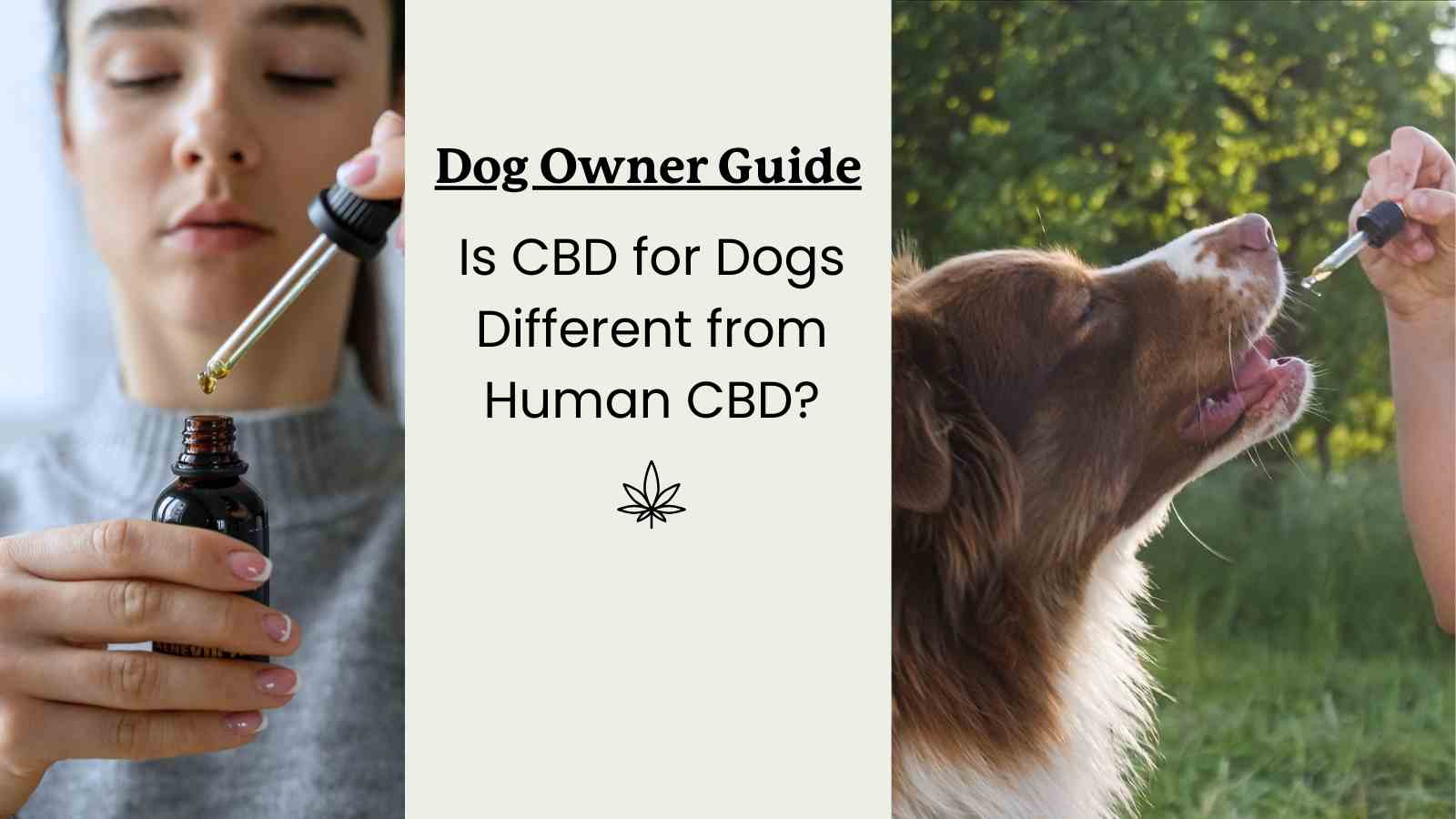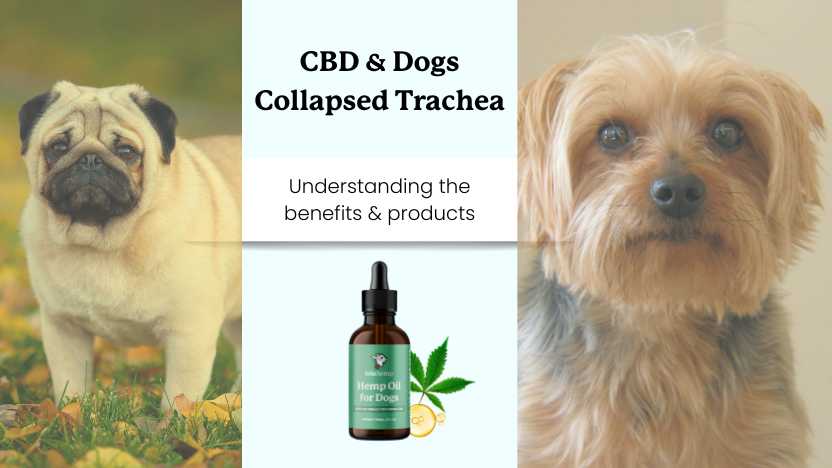CBD oil can be an excellent way to improve various aspects of your cat or dog's health if you choose the right product. CBD oil for dogs and CBD for pets in general are formulated differently than human CBD products.
This is extremely important, and many resources online do not have the facts straight. CBD for pets is not the same as CBD for humans. We'll cover the difference between pet CBD and human CBD in this article, ensuring that you're choosing the right option for your pet's health.
The Difference Between Pet CBD and Human CBD: Explained
If you're looking for a quick answer, here it is:
Human CBD products are often much stronger, and they're made with additional ingredients that are not safe for pets.

While the actual CBD is the same in products for both pets and humans, the concentration and additional ingredients are not the same.
This makes human CBD products unsafe for dogs and cats for a number of reasons. Let's look at those reasons.
Why Human CBD Products are Unsafe for Dogs and Cats
Because CBD for humans is almost exclusively stronger and made with human-specific ingredients, it is unsafe for the following reasons:
-
The added strength of human CBD is in place because humans have much larger bodies than dogs and cats. Too much CBD in your pet's system could cause them to experience negative side effects.
-
Human CBD oils often come with carrier oils and added ingredients that are dangerous for dogs. If your product includes any sweeteners such as Xylitol, it could be toxic for dogs.
-
Human products that aren't in the form of oil (like CBD gummies and edibles) are likely much more dangerous, as almost always include a wide range of ingredients that have not been tested for safety in dogs and cats.
-
All products should be tested for safety in pets before they're sold as pet supplements, and products designed specifically for humans have not undergone this testing.
-
Laws are looser with CBD products for humans, so there's no guaranteeing that your pet won't experience psychoactive effects from human CBD product you give them.
For all of these reasons, it's important that you find a CBD product specifically made for dogs, cats, or both.
Human CBD Gummies are Very Dangerous to Dogs
Human CBD gummies always pose a risk to dogs because they include ingredients selected for human consumption, not dogs. Gummies typically contain sugar, sweeteners, flavorings, and high concentrations of CBD (or THC in many cases).
Do not attempt to give your dog human CBD gummies in an effort to relieve seizures, pain, anxiety, or anything else. Instead, opt for a CBD product that has been formulated to be given to dogs in safe dosages.
How to Find The Right CBD Product for Your Dog
Here are some essential things to keep in mind when choosing a CBD product for your pet. Note that there are plenty of CBD options vet-formulated just for pets, such as Lolahemp's line of CBD products for dogs.
- Avoid Human CBD Oil
- Choose CBD tinctures that include full-spectrum or broad-spectrum CBD because the other cannabinoids in hemp plants work together to form a synergistic effect.
- Find a company that gives you dosing suggestions based on your cat or dog's weight, as dosage is incredibly important.
- Make sure that the company is clear about their manufacturing processes and doesn't include any sweeteners or other harmful chemicals in their formulation.
- Find a CBD tincture that's specifically made for the species of pet you have. CBD oil for dogs, for example, is likely a little different from CBD oil for cats. Some options, such as Lolahemp's Classic Full Spectrum Hemp Oil, are safe for both cats and dogs.
- Finally, use a reputable company. Reputable companies tend to have great reviews from pet owners who share videos, praise the benefits, and support the company for helping their pet.
Third-Party Batch Lab Testing
As a general rule of thumb, you should always look to buy from a company that offers reliable lab testing for every batch of their product. Do this whenever buying any CBD product (for people or pets). The company should also have a certificate of analysis on those results.
The CBD market is flooded with companies that may be offering products containing pesticides, herbicides, and other contaminants like heavy metals. In fact, some companies have been caught selling products with no CBD in them at all!
At Lolahemp, every one of our tinctures has a QR code so that customers can scan the codes with their phone to immediately bring up the batch lab testing for their bottle. Lab tests are always available on the website so customers can verify quality before they even buy.
To make sure you're getting a consistent and high-quality product for your dog, go with a company such as Lolahemp who provides batch lab tests for our full spectrum organic CBD oil.
Conclusion
There is a significant difference between human CBD products and CBD products made for pets. Most CBD products for humans are dangerous to dogs due to their presence of sweeteners, additional ingredients, and high concentrations of CBD.
Instead of trying to find a viable human-intended CBD product for your dog, simply explore the wide variety of CBD products available for dogs. You can find third-party tested, veterinarian-formulated, dog-safe CBD products.











Comments
I’m looking for A CBD OIL FOR MY SMALL DOG THAT IS HAVING A PROBLEM WITH HIS COLLAPSE TRACHEA SO HE CAN BREATHE BETTER SO HE CAN LIVE MORE CONFORTABLE WITH LONGER LIFE. DO YOU THINK YOU CAN HELP ME WITH THIS???
Great article,neededtoknow what to use on my 100lb great pyrineese. Will now use yours instead what I had around the house even though it seemed to help her. Still only used 1cc BID hope she lives through my ignorance ,she is going to be 19 in June and life expectancy is 8. She is my rescue at 3years of age who ran away from her other two adoptors. Look how long she has stayed with me. I would like her to be here forever.
Just ordered your product!!! No directions as give orally or put in dogs food! What is the best way to administer